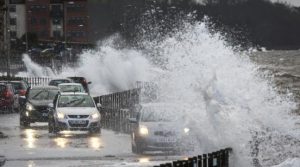Vehicle claims 
- Rear end impacts – When there’s snow or ice on the road, it’s important to maintain a safe stopping distance – generally ten times greater than you would normally allow. Tail end shunts rise considerably in the winter months – so stopping in time will help you both to stay safe and to maintain your no claims bonus.
- Mechanical failure – If your car has any faults, it’s best to get them checked ahead of winter, when problems could be worsened by the weather, including driving on wet roads. It’s highly recommended that you hold Breakdown insurance – especially if you have a specialist vehicle – otherwise repairs could amount to much higher costs. Have your car regularly serviced to avoid mechanical failure during the year and include antifreeze and tyre conditions in your winter services.
- Collisions with objects – Nearly half of all winter car accidents are a result of skidding – predominantly hitting lamp posts, embankments, ditches and parked cars – as a consequence of the harsher weather. Changing to winter tyres can help for extra traction, when the roads are wet and slippery.
- Incidents at junctions – Freezing fog, low sun and the spray from wet roads, as well as the earlier evenings, can all hinder your visibility, so extra vigilance is necessary. Ensure that your screen wash levels remain topped up and remember that it is against the law to drive before your windows are fully clear.
- Vehicle theft – It is important that you don’t leave your running car unattended whilst it warms up. Even with theft cover, your motor policy won’t cover you for this risk – where your car is more vulnerable to theft.

Home Claims
- Water leaks – Often in winter, a leak can occur when water in the pipes gets close to freezing point. This increases the pressure in the pipe which can then burst the pipe if the pressure gets too high. If it’s not spotted early enough – water loss from a burst pipe can be the equivalent of two full baths in one hour. Piping in unheated areas, such as your loft or garage should be lagged, whilst maintaining your heating at 12 degrees – to help prevent your pipes freezing. Check them regularly to be sure.
- Storm damage – There’s often an increase in strong storms in winter, coming in from across the Atlantic. Whilst storm damage is usually included in your household policy, insurers do stipulate that maintaining your home well is still your responsibility. If a dilapidated roof or poorly maintained guttering gives way in a storm, making a claim may be more difficult. Ahead of winter, try to get around to any repair work that needs doing in/ on your property – including repairing fences and gates, which can be excluded from storm damage claims.
- Flood coverage – Flood cover is one of the most important parts of cover under your home policy. Whilst you can’t affect the rising water levels, you can reduce flood damage, should the worst happen. Keeping some sandbags handy and sealing your walls can help.
- Fire – Fire coverage comes as standard with a home policy, but in winter it’s important to keep chimneys and flues well maintained – as they may get blocked in bad weather. Electric blanket use increases in winter and two fires every day in England are started by electric blankets, whilst more than 7,500 chimney fires occur every year. So, extra vigilance is important.
- Theft – Unfortunately, winter time, means that home burglaries increase. Keep valuables out of easy reach and those new gadgets etc out of view of your front windows.
